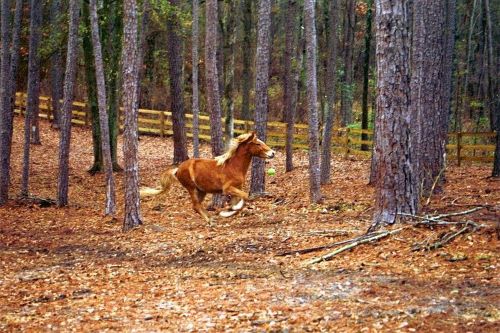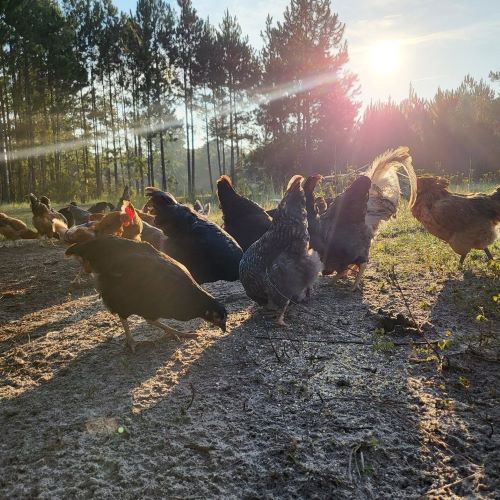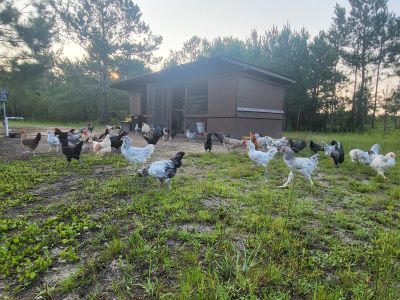Preserving Nature’s Rhythm: Cats, Dogs, Horses, and Bees in Sustainable Farming
Welcome to our free-range farm, where sustainable farming practices are at the heart of everything we do. Here, we believe in providing a natural and stress-free environment for our animals, ensuring their well-being and promoting biodiversity.
On our farm, you’ll find a diverse range of animals that contribute to the harmonious ecosystem we have created. From our free-range chickens to our beloved cats, dogs, horses, and bees, each resident plays a vital role in our sustainable farming practices.
The Free-Range Chickens
When it comes to egg production, there’s nothing quite like raising free-range chickens. These feathered friends are given the freedom to roam and forage, resulting in eggs that are not only healthier but also tastier.
Unlike chickens confined to cages or small enclosures, our free-range chickens have the opportunity to explore the farm, peck at insects, and scratch the ground for nutritious plants and seeds. This natural diet enhances the flavor and nutritional value of their eggs.
At our farm, we prioritize the well-being of our chickens. We believe in providing them with a stress-free environment that mimics their natural habitat. By allowing them to roam freely, we ensure they have ample space to exercise, socialize, and express their natural behaviors.
Our commitment to the welfare of our chickens goes beyond their physical needs. We understand that a calm and contented chicken produces better-quality eggs. That’s why we strive to create a peaceful and harmonious environment where our chickens can thrive.
By choosing free-range eggs from our farm, you not only support sustainable farming practices but also contribute to the welfare of these remarkable creatures. So, the next time you savor one of our eggs, remember the journey it took from our free-range chickens to your table.
The Garden and Beyond
At our free-range farm, we believe in the importance of self-sufficiency and reducing our ecological footprint. One of the ways we achieve this is through our thriving garden, which plays a vital role in providing fresh produce for our homesteaders’ table.
Our garden is a testament to our commitment to sustainable farming practices. We have integrated aquaponics and hydroponics systems in the past, harnessing the power of water to cultivate crops efficiently and effectively. These systems have had a significant impact on our ability to grow a wide variety of vegetables and herbs throughout the year.
With aquaponics, we have created a symbiotic relationship between fish and plants. The fish waste provides essential nutrients for the plants, while the plants filter and purify the water for the fish. This closed-loop system not only minimizes water usage but also maximizes productivity.
Hydroponics, on the other hand, allows us to grow plants without soil, using nutrient-rich water solutions instead. This method eliminates the need for traditional soil-based farming, reducing the risk of soil erosion and nutrient depletion. It also enables us to grow crops vertically, optimizing space and increasing overall yield.
By embracing these innovative farming techniques, we have been able to cultivate a diverse range of vegetables, including leafy greens, tomatoes, cucumbers, and herbs. Our garden not only provides us with fresh, nutritious produce but also serves as a model for sustainable agriculture.
However, our dedication to self-sufficiency goes beyond the garden. We strive to reduce our ecological footprint in every aspect of our farm. From implementing rainwater harvesting systems to composting organic waste, we are constantly seeking ways to minimize waste and maximize resource efficiency.
Our garden and sustainable farming practices are a testament to our commitment to a more harmonious relationship with nature. By embracing these methods, we not only provide for our own needs but also contribute to the overall health and well-being of our ecosystem.
The Furry Friends: Cats and Dogs
On our free-range farm, we are fortunate to have a delightful mix of cats and dogs who play an essential role in maintaining a balanced ecosystem. These furry friends not only bring joy and companionship to our homesteaders but also contribute to the overall well-being of our farm.
Controlling Rodent Populations
Our resident cats are natural-born hunters and play a crucial role in keeping our farm free from rodents. With their keen senses and agile hunting skills, they help control rodent populations, ensuring the safety of our chickens and other animals. These feline hunters are always on the prowl, keeping our barns and fields free from unwanted pests.
Protecting the Farm and Providing Companionship
Our loyal dogs are not only our protectors but also our trusted companions. They tirelessly patrol the perimeter of our farm, keeping potential threats at bay. Their presence alone acts as a deterrent to predators, ensuring the safety of our livestock.
But their role goes beyond protection. Our dogs are an integral part of our daily lives, providing us with unwavering companionship and unconditional love. Whether it’s a long walk through the fields or a cozy evening by the fire, our dogs are always by our side, reminding us of the simple joys of farm life.
Together, our cats and dogs create a harmonious environment on our farm. They not only contribute to the overall well-being of our animals but also bring a sense of warmth and companionship to our homesteaders. Their presence reminds us of the interconnectedness of all living beings and the importance of nurturing a balanced ecosystem.
The Noble Steeds: Horses
Horses have a long and storied history of companionship with humans, and they have been an essential part of various cultures and societies for centuries. While horses have been a small part of our history, we recognize the significant role they played in the broader context of sustainable farming practices and human development.
Historical Significance
Throughout history, horses have been valued for their strength, speed, and intelligence. They were instrumental in transportation, agriculture, and warfare, shaping the course of human civilization. Horses facilitated trade and communication, allowing cultures to connect and exchange knowledge and resources.
Contributions to Sustainable Farming
In the context of sustainable farming, horses played a crucial role in reducing environmental impact. Before the advent of mechanized agriculture, horses were relied upon for plowing fields, tilling soil, and hauling goods. Their use minimized the need for fossil fuel-powered machinery, resulting in a more sustainable and eco-friendly approach to farming.
Horses were also employed in rotational grazing systems, allowing pastures to recover while they grazed on different sections. This practice helped maintain soil health and prevented overgrazing, promoting a sustainable balance between agriculture and the natural environment.
Educational Opportunities and Companionship
Beyond their practical contributions, horses have provided countless educational opportunities and companionship for humans. Learning to care for and ride horses instills responsibility, empathy, and respect for animals. Interacting with these gentle giants fosters a deeper connection to nature and an understanding of the interdependence between humans and the animal kingdom.
Modern-Day Implications
In the modern era, while horses may not be as prevalent in traditional farming practices, their significance endures in various aspects of sustainable living. Horses are often employed in therapeutic settings, assisting individuals with physical and emotional challenges. Additionally, some communities have reintroduced horses in sustainable agriculture, using them for lighter tasks and low-impact land management.
Honoring Their Legacy
Though we no longer have horses on the farm, we honor their historical significance and the vital role they played in our sustainable farming practices. While they may not be present today, their legacy remains an integral part of our farm’s heritage.
As our farm continues to evolve, we cherish the memories of our noble steeds and embrace their contributions to our past and present sustainable farming practices. Their spirit of hard work, companionship, and connection to nature continues to inspire us as we move forward on our journey toward a more harmonious and sustainable future.
The Buzzing Bees: Beekeeping
Beekeeping plays a crucial role on our free-range farm, as we understand the importance of bees in pollination and their contribution to maintaining a healthy ecosystem. We are dedicated to maintaining beehives and promoting the well-being of these vital pollinators.
Importance of Bees in Pollination
Bees are essential for pollinating plants, including the crops in our garden. As they move from flower to flower, they transfer pollen, allowing plants to reproduce and produce fruits, vegetables, and seeds. Without bees, our garden and surrounding flora would struggle to thrive.
Beekeeping Benefits
Beekeeping not only supports local biodiversity but also provides us with the sweet reward of honey production. Our bees work diligently to collect nectar from various flowers, which they transform into delicious honey. This natural sweetener is not only a treat for us but also a valuable ingredient in many of our homemade recipes.
Promoting a Bee-Friendly Environment
We take great care to create a bee-friendly environment on our farm. We ensure that our bees have access to a diverse range of flowering plants throughout the year, providing them with a continuous source of nectar and pollen. By avoiding the use of harmful pesticides and chemicals, we protect the health of our bees and maintain the integrity of their honey.
Additionally, we provide our bees with suitable hives and regularly monitor their health and well-being. This includes checking for signs of disease, ensuring they have enough food, and protecting them from extreme weather conditions.
By prioritizing the well-being of our bees, we not only support their population but also contribute to the overall health of our farm and the surrounding ecosystem.
Conclusion
As we conclude our journey through the diverse residents of this free-range farm, it is evident that each animal plays a vital role in sustainable farming practices. From the free-range chickens to the cats, dogs, horses, and bees, this farm is a harmonious ecosystem where animal welfare and biodiversity thrive.
The free-range chickens, with their ability to roam and forage freely, contribute to healthier and tastier eggs. Their stress-free environment ensures their well-being and the quality of the eggs they produce. By supporting local free-range farms like this one, you are not only enjoying delicious eggs but also promoting animal welfare and sustainable farming.
While the chickens provide eggs, the farm’s garden goes beyond by providing fresh produce for the homesteaders’ table. The integration of aquaponics and hydroponics systems in the past has further enhanced their self-sufficiency and reduced their ecological footprint. By embracing sustainable farming practices, this farm showcases the importance of responsible food production.
Free-Range Farm Companions
The furry friends, including the cats and dogs, play a crucial role in maintaining a balanced ecosystem. The cats help control rodent populations, ensuring the safety of the chickens and other animals. The dogs, on the other hand, protect the farm and provide companionship to the homesteaders. Their presence adds an extra layer of security and joy to the farm’s daily life.
Let’s not forget the noble steeds, the horses, which have been an integral part of farming history. These majestic creatures contribute to farm work, transportation, and recreational activities. Their presence symbolizes a farm’s commitment to responsible horse care and their role in sustainable farming practices.
Lastly, the buzzing bees deserve special recognition for their vital role in pollination. The farm’s dedication to maintaining beehives supports local biodiversity and ensures the production of honey. By creating a bee-friendly environment, this farm promotes the well-being of these essential pollinators and highlights the interconnectedness of all living beings.
Clucky Cottage: A Great Farm For Nature
This free-range farm stands as a shining example of sustainable farming practices. Its commitment to animal welfare, biodiversity, and creating a harmonious ecosystem is commendable. By supporting local, free-range farms like this one, you are not only enjoying high-quality products but also contributing to a more sustainable lifestyle.
Join the movement towards a greener future. Support local, free-range farms, and embrace a more sustainable lifestyle. Together, we can make a difference in the well-being of animals, the environment, and our own health.
Related FAQ
Why is sustainable farming important for the environment? Sustainable farming practices minimize the use of harmful chemicals and promote responsible land and resource management. This approach helps reduce soil erosion, conserve water, and preserve biodiversity, contributing to a healthier and more resilient ecosystem.
How do free-range chickens contribute to sustainable agriculture? Free-range chickens play a crucial role in sustainable farming by having the freedom to roam and forage naturally. Their natural diet enhances the nutritional value of their eggs, and their ability to control insects helps reduce the need for chemical pest control methods.
What are the benefits of using horses in agriculture? Horses provide eco-friendly and low-impact alternatives to mechanized agriculture. They can plow fields, transport goods, and assist in various farm tasks, reducing the reliance on fossil fuel-powered machinery and promoting sustainable land management.
How does beekeeping support biodiversity? Beekeeping is essential for preserving biodiversity as bees are crucial pollinators for many plant species. By collecting nectar from diverse flowers, bees facilitate cross-pollination, enabling plant reproduction and supporting a wide variety of flora and fauna in the ecosystem.
What are the key features of an eco-friendly farm? An eco-friendly farm implements practices that prioritize environmental stewardship, resource conservation, and sustainability. Key features may include organic farming methods, renewable energy sources, water-efficient irrigation, rotational grazing, and wildlife-friendly habitat management.
Key Take Away
- Sustainable farming practices are at the core of our free-range farm, promoting eco-conscious agriculture and supporting animal welfare.
- Free-range chickens roam and forage freely, resulting in healthier and tastier eggs due to their natural diet.
- Innovative aquaponics and hydroponics systems in our garden exemplify our commitment to sustainable agriculture, minimizing water usage and maximizing crop yield.
- Cats, dogs, and horses play vital roles in maintaining a balanced ecosystem on our farm, contributing to pest control, protection, and recreational activities.
- Beekeeping supports local biodiversity by ensuring essential pollination, resulting in a thriving ecosystem and delicious honey production.
Glossary
- Sustainable Farming: Sustainable farming refers to an agricultural approach that focuses on long-term environmental, social, and economic viability. It aims to meet current food production needs without compromising the ability of future generations to meet their needs.
- Free-Range Chickens: Free-range chickens are poultry allowed to roam outdoors and engage in natural behaviors such as foraging for insects and plants. They are not confined to cages, allowing them to lead healthier and more enriched lives.
- Aquaponics: Aquaponics is a sustainable farming method that combines aquaculture (fish farming) with hydroponics (growing plants in water). In this closed-loop system, fish waste provides nutrients for plants, while the plants filter and purify the water for the fish.
- Hydroponics: Hydroponics is a soilless farming technique where plants grow in nutrient-rich water solutions. This method maximizes resource efficiency, minimizes water usage, and allows for vertical cultivation, optimizing space.
- Rotational Grazing: Rotational grazing is a sustainable pasture management strategy where livestock are moved regularly to different grazing areas. This approach prevents overgrazing, allows pastures to recover, and promotes healthier vegetation growth.
- Beekeeping: Beekeeping, also known as apiculture, is the practice of raising and caring for bees, primarily for honey production and pollination services. Beekeepers manage beehives to support the health and well-being of bees.
- Animal Welfare: Animal welfare refers to the ethical and responsible treatment of animals, ensuring their physical and psychological well-being. In sustainable farming, animal welfare is prioritized to provide a stress-free environment and promote natural behaviors.
- Ecosystem: An ecosystem refers to a community of living organisms (plants, animals, and microorganisms) and their physical environment, interacting and functioning as a unit. Sustainable farming practices aim to maintain a balanced ecosystem for ecological health.
- Eco-Friendly: Eco-friendly, short for ecologically friendly, describes practices, products, or lifestyles that are not harmful to the environment. Eco-friendly farming methods focus on reducing environmental impact and preserving natural resources.
- Pollination: Pollination is the transfer of pollen from the male part (anther) to the female part (stigma) of a flower, enabling fertilization and subsequent fruit and seed production. Pollination is crucial for plant reproduction and is facilitated by pollinators like bees, butterflies, and other animals.


